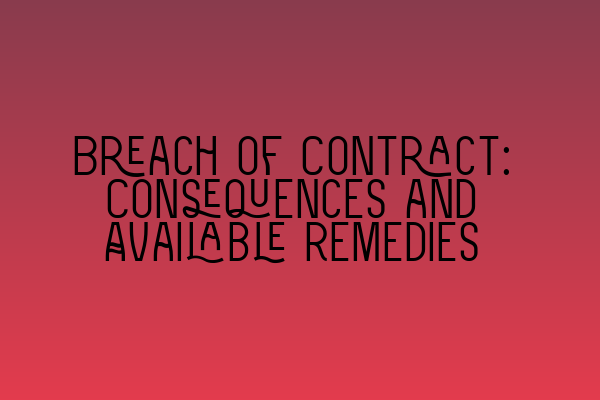Breach of Contract: Consequences and Available Remedies
Introduction:
Contracts are the backbone of any business transaction or legal agreement. They provide a solid framework for parties to outline their rights, obligations, and expectations. However, there are instances where one party fails to fulfill their contractual obligations, leading to a breach of contract. In such situations, it is essential to understand the consequences of breach and the available remedies. This blog post will delve into the various aspects of breach of contract, explore its implications, and discuss the remedies that can be pursued to rectify the breach.
1. Understanding Breach of Contract:
A breach of contract occurs when one party fails to perform their contractual obligations, whether partially or entirely. This failure can take various forms, such as delay in performance, substandard work, non-payment, or any other violation of the agreed-upon terms and conditions. It is important to note that not all breaches are equal, and they can be categorized into material breaches and minor breaches.
2. Consequences of Breach of Contract:
When a breach of contract occurs, it can have significant consequences for both parties involved. The non-breaching party may suffer financial losses, damage to reputation, and disruption to their operations. The breaching party, on the other hand, may face legal consequences, including financial penalties, reputational damage, and potential litigation.
3. Available Remedies for Breach of Contract:
In the event of a breach of contract, several remedies are available to the aggrieved party. These remedies aim to restore the non-breaching party to the position they would have been in had the breach not occurred. The available remedies typically include:
a. Damages:
Damages are the most common remedy sought in cases of breach of contract. They are monetary compensation awarded to the non-breaching party to cover their losses resulting from the breach. Damages can be categorized into two types: compensatory damages and consequential damages. Compensatory damages are awarded to reimburse the non-breaching party for their actual financial losses, while consequential damages are awarded for indirect losses caused by the breach.
b. Specific Performance:
Specific performance is an equitable remedy sought when monetary damages are inadequate to rectify the breach. In such cases, the court orders the breaching party to fulfill their contractual obligations as specified in the agreement. Specific performance is typically granted in cases involving unique assets or when the non-breaching party can demonstrate that monetary compensation is insufficient.
c. Rescission and Restitution:
Rescission refers to the cancellation of the contract in cases of material breach. When a contract is rescinded, both parties are released from their obligations, and they are restored to their pre-contractual positions. Restitution, on the other hand, involves returning any benefits received from the breaching party, such as payments or goods, to the non-breaching party.
d. Injunctions:
Injunctions are court orders that prohibit the breaching party from engaging in certain actions or require them to perform specific actions. They are sought when monetary compensation or other remedies are inadequate to prevent further harm. Injunctions can be temporary or permanent, depending on the circumstances.
4. Seeking Legal Assistance:
When faced with a breach of contract, it is crucial to seek legal assistance from a solicitor specializing in contract law. An experienced solicitor can assess the merits of your case, advise on the most appropriate legal remedies, and guide you through the legal process. Their expertise ensures that your rights are protected and that you are adequately compensated for the breach.
Conclusion:
Breach of contract can have serious consequences for both parties involved. It is essential to understand the implications of breach and the available remedies to address the situation effectively. Seeking legal assistance from a specialized solicitor is crucial to navigate the complexities of contract law and to ensure that your rights are upheld. By knowing your options, you can take the necessary steps to rectify the breach and minimize the impact on your business or personal life.
Related Articles:
– SQE 1 Practice Exam Questions
– SQE 1 Practice Mocks FLK1 FLK2
– SQE 2 Preparation Courses
– SQE 1 Preparation Courses
– SRA SQE Exam Dates
